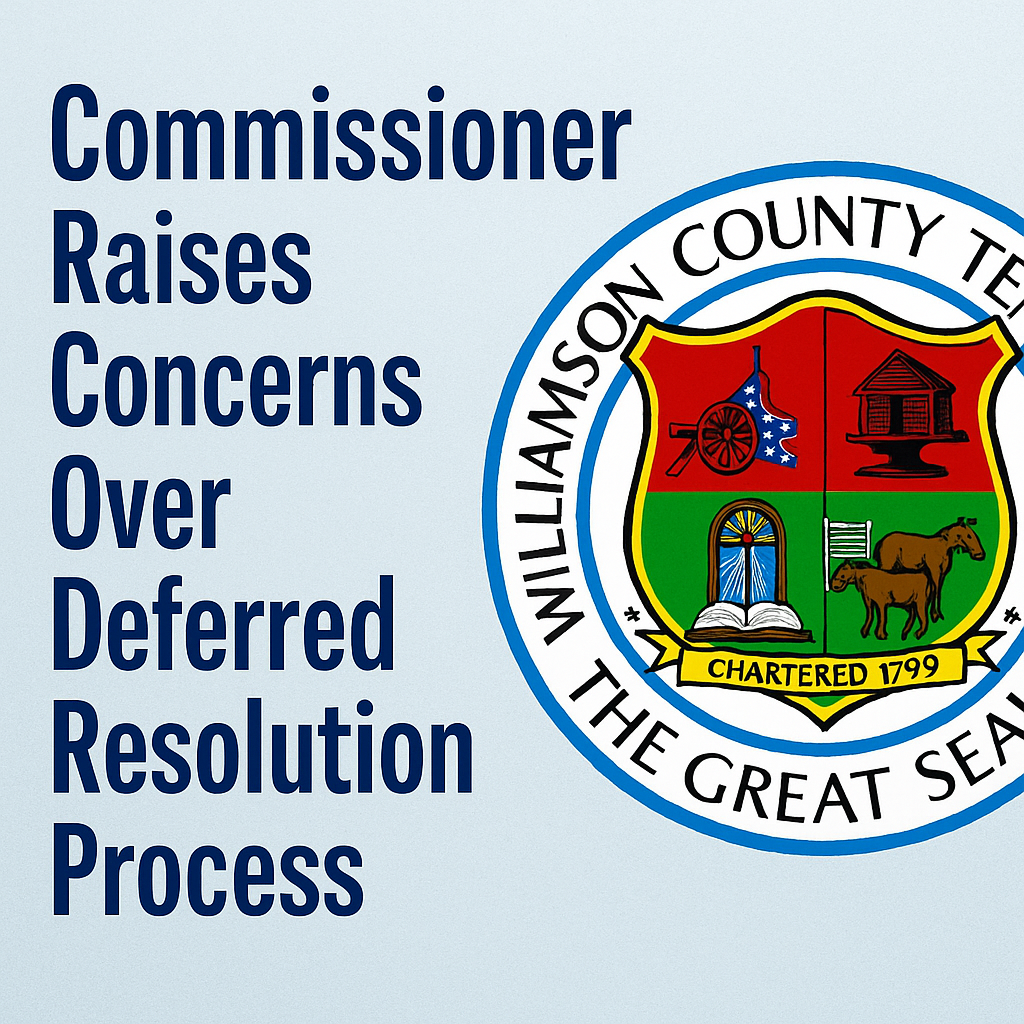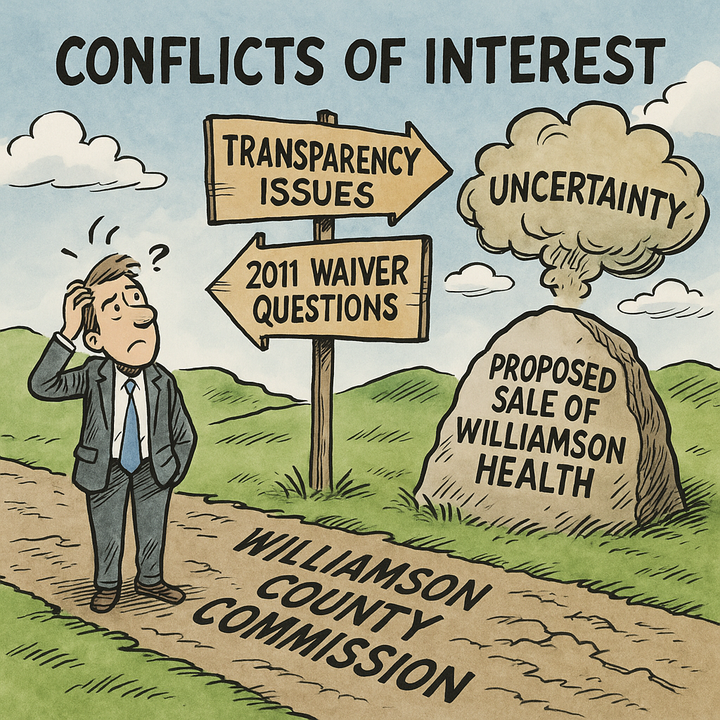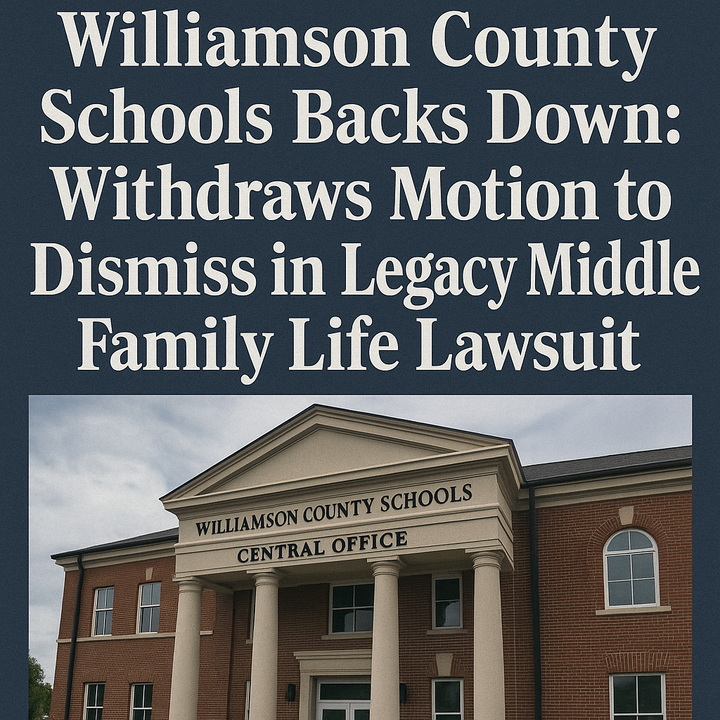Commissioner Christopher Richards calls out serious procedural violations after his resolution was mishandled by the Williamson County Commission. His letter demands answers, transparency, and a return to rule-based governance.
Williamson County, TN – A procedural dispute is unfolding within the Williamson County Commission after District 7 Brentwood Commissioner Christopher Richards formally challenged the way his resolution—Resolution No. 1-25-12—was handled following its deferral by the full commission earlier this year.
In a letter addressed to County Commission Counsel Jeff Moseley, Commissioner Richards laid out what he described as a series of procedural violations and transparency failures surrounding the resolution he sponsored, which calls for a study on how an increase in the county’s Adequate Facilities Tax (AFT) might affect the Education Impact Fee.
At issue is what happened after the resolution was deferred by a 22–1 vote on January 13, 2025. According to Commissioner Richards, once a resolution has been deferred by the full commission, it remains under the commission’s jurisdiction and cannot be sent back to committee unless the full body explicitly votes to do so. That never happened.
Yet, weeks later, the resolution reappeared before the Budget Committee—with no public authorization by the commission and without Richards being notified. He only learned of its reintroduction because he happened to attend the committee meeting that day.
“While I was able to defend the resolution, I was not prepared at all, as I had received no advance notice or agenda placement,” Richards wrote.
A Quiet Reappearance
The resolution in question would authorize the County Mayor to seek proposals for a study on whether raising the commercial AFT rate—currently set at just $0.34 per square foot in unincorporated areas—could justify a lower Education Impact Fee under state legal precedent. The impact fee, first adopted in 2016, allows the county to charge developers to offset the cost of school expansion resulting from residential growth.
Richards' proposal sought $50,000 from the unappropriated general fund balance to pay for the study. The resolution passed both the Tax Study Committee (4–1) and the Budget Committee (3–1) before reaching the full commission in January—where it was deferred.
According to Richards, Williamson County Rule 5.5 and Robert’s Rules of Order §34 make clear that once a resolution is deferred, it cannot return to committee without explicit action by the full body.
“The Budget Committee should not have reviewed or acted on this resolution unless the full Commission explicitly referred it back to committee,” Richards stated.
Moreover, an email from the Mayor’s office dated January 14, 2025 reportedly acknowledged that the resolution did not need to go back to committee, further deepening questions about who directed its return.
Lack of Transparency and Notification
Richards also noted that the resolution was not placed on the Budget Committee’s official agenda, violating the customary and expected transparency required of county proceedings. As the resolution’s sponsor, he was given no notice, leaving him unprepared to advocate for a measure he introduced.
“Any further consideration by a committee should have included notification to me as the sponsor and placement on the committee’s agenda,” Richards wrote.
His letter calls this a violation not only of county rules but of basic fairness and accountability to both elected officials and the public they serve.
What the Resolution Would Do
The measure at the heart of the dispute focuses on commercial development taxes, not residential. The Adequate Facilities Tax allows the county to charge up to $2.00 per square foot on non-residential development, but currently assesses just $0.34—and only in unincorporated areas.
Meanwhile, the Education Impact Fee has become the county’s primary mechanism to offset school growth costs, but legal precedent requires the county to credit developers for any other growth-related taxes, such as the AFT. Richards’ resolution sought to determine whether increasing the commercial AFT rate might lead to a required offset that lowers the impact fee—and whether that tradeoff would result in a net loss or gain for the county.
According to the resolution text, the study would provide “a detailed comprehensive study to determine whether increasing the Adequate Facilities Tax would require the County to provide a credit under the Education Impact Fee which would lower the permissible rates that may be assessed under the impact fee.”
Formal Requests for Action
Commissioner Richards is requesting that Commission Counsel Jeff Moseley take immediate steps to address the issue and ensure adherence to proper procedures going forward. His letter requests the following actions:
- An investigation into who authorized the resolution’s return to the Budget Committee without full commission approval.
- A clarification of procedural rules regarding deferrals and referrals.
- A written assurance that any future reconsideration of deferred resolutions will include proper sponsor notification and placement on official agendas.
- A release of all communications related to the resolution’s reintroduction, including emails, memos, and meeting minutes.
“Transparency and adherence to established procedures are essential for maintaining trust in our legislative process,” Richards concluded.
As Williamson County continues to grapple with the pressures of rapid population growth and strained infrastructure, debates over who pays for new development—and how that cost is calculated—are expected to intensify. But equally critical is ensuring that procedural integrity and legislative transparency are not cast aside in the process.
TruthWire News will continue to monitor developments surrounding Resolution 1-25-12 and the broader implications it raises for governance in Williamson County.
If you support what I do, please consider donating a gift in order to sustain free, independent, and TRULY CONSERVATIVE media that is focused on Middle Tennessee and BEYOND!





Comments ()